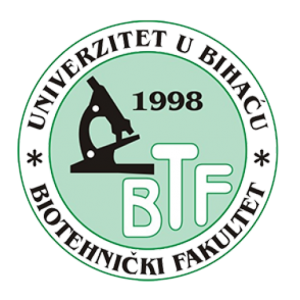
University of Bihać, Biotechnical Faculty together with 12 partners Universities and institutes from EU countries, Western Balkans and the Republic of Turkey took part in the Erasmus + project “Educational Capacity Strengthening for Risk Management of Non-native Aquatic Species in Western Balkans (Albania, Bosnia and Herzegovina and Montenegro)”- RiskMan. (ref. no. 619384-EPP-1-2020-1-TR-EPPKA2-CBHE-JP). The project was approved and funded by the European Union through the ERASMUS + CBHE program (Erasmus + Capacity Building in Higher Education Call EAC / A02 / 2019 – Selection Year 2020
https://eacea.ec.europa.eu/sites/eacea-site/files/cbhe_2020-results.pdf)
The project team of the University of Bihać, Biotechnical Faculty consists of:
- Assoc Prof. Azra Bakrač, PhD
- Asst Prof. Emir Mujić, PhD
- MA Subha Džafić, senior Assistant
The main aim of the project is to promote the education of stakeholders and high education in the field of risk assessment of non-native (NN) species and to stimulate research and cooperation on the management of NN species in the Western Balkan Region.
Aquaculture is currently one of the most important human food resources globally and is an important contributor to food security, income generation and employment in local economies. Nevertheless, in order to remain competitive, the aquaculture industry is diversifying over the years involving the use of alternative species. Regrettably, this practice has led to the introduction of non‐native (NN) species to natural water bodies that have been found to exert adverse impacts on native species and ecosystems. Ecological impacts of invasive alien species range from single-species interactions and reduction in individual fitness of native species to population declines, local extinctions, changes in community composition and effects on entire ecosystem processes and wider ecosystem function. Moreover, non-native species can lead to major economic damage and significant impacts on human well‐being and, along with climate change, are widely recognized as one of the main threats to aquatic biodiversity.
Given that risks can be reduced merely by communicating and educating industry and the general public to the hazards associated with the release of non-native organisms into the open environment, the risk analysis process involves protocols through it is possible to identify potentially invasive species and assess the risks associated with those. Due to its zoogeographical position and the high degree of endemism the Western Balkans region’s biodiversity is particularly vulnerable to the negative impacts of NN species introductions, leading to high levels of threat to native biodiversity. This further highlights the importance of considering the impacts of NN species in freshwater ecosystems in the countries of this region. Consequently, these efforts are expected to contribute to aquaculture sustainability, reduce economic distortion and support countries having limited regulation on both conservation and aquaculture issues.
Partners:
- Turkey (Coordinator): Muğla Sıtkı Koçman University
- Italy: University of Palermo
- Croatia: University of Zagreb
- North Macedonia: Hydrobiological Institute Ohrid
- Albania: ACEPSD
- Albania: ALB ADRIATICO 2013
- Albania: Agricultural University of Tirana
- Bosnia and Herzegovina: University of Sarajevo
- Montenegro: University of Montenegro
- Greece: iSea
- Bosnia and Herzegovina: University of Bihać
- Albania: University College of Business
